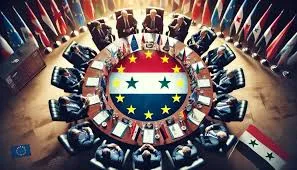The European Union (EU) has welcomed the alignment of ten countries with its restrictive measures against Syria. The countries that have aligned with the EU's restrictive measures are:
· North Macedonia
· Montenegro
· Albania
· Ukraine
· Republic of Moldova
· Bosnia and Herzegovina
· Georgia
· Iceland
· Liechtenstein
· Norway
These countries will now freeze the assets of, and restrict the travel of, individuals and entities designated by the EU as being responsible for the Syrian conflict or for violating human rights in Syria. They will also prohibit the export of certain goods and technologies to Syria that could be used for military purposes.
The EU believes that the alignment of these countries with its restrictive measures will send a strong message to the Syrian government that the international community is united in its condemnation of the conflict and its support for the Syrian people.
The EU has also extended the restrictive measures against Syria until June 1, 2024. This is to ensure that the pressure on the Syrian government continues until there is a genuine political solution to the conflict.
The humanitarian exemption to the restrictive measures has also been extended until February 24, 2024. This means that international organizations and certain defined categories of actors involved in humanitarian activities will still be able to receive funds and economic resources from individuals and entities designated by the EU.
The EU is committed to supporting the Syrian people and to helping them to rebuild their country. The restrictive measures against Syria are an important part of this effort. By aligning with the EU's restrictive measures, these countries are sending a strong message of support for the Syrian people and for a peaceful solution to the conflict.
In addition to the above, here are some other key points from the statement:
· The EU is calling on the Syrian government to immediately cease all violence against its own people and to allow unimpeded access for humanitarian aid.
· The EU is also calling on the Syrian government to engage in genuine and inclusive negotiations on a political solution to the conflict.
· The EU is committed to working with its partners to achieve these goals.
The statement concludes by saying that the EU will continue to monitor the situation in Syria closely and will take further action if necessary.
What kind of goods and technologies are restricted?
The EU restrictive measures against Syria prohibit the export of certain goods and technologies to Syria that could be used for military purposes. These include:
· Arms and related materiel
· Dual-use goods and technologies
· Oil and gas equipment
· Chemicals and biological agents
· Telecommunications equipment
· Information security equipment
· Navigational equipment
· Computers and software
The EU also prohibits the export of certain services to Syria that could contribute to the Syrian government's military capabilities. These include:
1. Technical assistance
2. Training
3. Financing
What does Iran have to do with this?
Iran is relevant to the EU restrictive measures against Syria because Iran has been providing military support to the Syrian government. Iran has been providing Syria with drones and other weapons that have been used to attack civilians and civilian infrastructure. The EU is concerned that Iran's military support to Syria is prolonging the conflict and causing further suffering to the Syrian people.
The EU's restrictive measures against Iran are intended to put pressure on Iran to end its support for the Syrian government and to change its behavior in the region. By prohibiting the export of certain goods and technologies to Iran, the EU is hoping to limit Iran's ability to support the Syrian government and to pressure Iran to change its behavior.
The EU's restrictive measures against Syria and Iran is a significant development. They send a strong message to both countries that the international community is united in its condemnation of their actions and its support for the Syrian people and the Iranian people. The EU is committed to using all available tools to end the Syrian conflict and the Iranian nuclear crisis and to bring about a peaceful solution.


